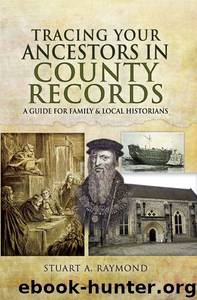Tracing Your Ancestors in County Records: A Guide for Family and Local Historians by Stuart A Raymond

Author:Stuart A Raymond [Raymond, Stuart A]
Language: eng
Format: azw3
Tags: REFERENCE / Genealogy and Heraldry
ISBN: 9781473879096
Publisher: Pen and Sword
Published: 2016-09-30T04:00:00+00:00
Chapter 8
PAUPERS, VAGRANTS AND LUNATICS
PAUPERS
As the population expanded during the sixteenth century, so did poverty. Increasing numbers of vagrants alarmed governments: poverty, vagrancy, masterlessness and landlessness all seemed to threaten the social order. And the abolition of monasteries and chantries, which had previously offered some relief to the poor, did not help.
I don’t give to idlers.
The Poor Law Acts of 1597 and 1601 provided the official remedy for over two centuries. Under them, parish overseers provided work, relieved the impotent, bound pauper children as apprentices and levied parochial poor rates when necessary. Churchwardens were ex officio overseers. The records of overseers are parish records.1
Justices of the Peace appointed overseers on the nomination of parish vestries, examined their accounts and supervised their work. Between 1597 and 1834, this task occupied much of their time. They adjudicated disputes between paupers and overseers, between overseers and ratepayers, and between parishes. Justices had to be careful: paupers knew what their legal rights were, and did everything they could to exert them. The paupers of Potterne (Wiltshire), ‘a very discontented and turbulent race’, even clubbed together to purchase a copy of Burn’s Justice of the Peace and Parish Officer, to inform themselves of their entitlements.2
Justices could grant habitation orders, requiring overseers to provide the poor with accommodation. They determined places of settlement, made removal orders, authorised the binding of pauper apprentices and conducted bastardy examinations to determine the parentage of bastards. Bastardy orders made by Justices required fathers to pay maintenance, either to the mother or to the overseers, until the child reached the age of seven, that is, until he could be apprenticed. Bastards’ parents – especially their mothers – were frequently whipped.
The Elizabethan system, in its essentials, lasted for more than two centuries. When it was replaced in 1834, Justices continued to have some responsibilities. They served as guardians in the new Unions, continued to determine settlement, approved rates, adjudicated over emergency relief and settled disputes. Pauper lunatics (see below) continued to be admitted to asylums under Justices’ control. Nevertheless, the 1834 Act contributed to the erosion of Justices’ powers which we have already seen in the courts, and which also followed the introduction of professional policing.
The Elizabethan Acts provided that paupers were to receive relief from the parish in which they were ‘settled’. Broadly, they could claim settlement by birth, by apprenticeship, by service for more than one year, by serving as a parish officer or by having paid rates on property valued at more than £10. The concept of ‘settlement’ received ever more precise definition after the 1662 Act of Settlement, and led to numerous disputes between parishes. The law of settlement has been described as ‘that monstrous entanglement of statutes, amendments, and judgments … which … brought so much grist to the mill of the country attorney’.3
Justices’ involvement in the process began when two of them examined paupers (or sometimes merely those thought likely to be paupers in future) to determine their settlement. Settlement examinations record the information given. They provide somewhat biased mini-biographies.
Download
This site does not store any files on its server. We only index and link to content provided by other sites. Please contact the content providers to delete copyright contents if any and email us, we'll remove relevant links or contents immediately.
Twilight of the Idols With the Antichrist and Ecce Homo by Friedrich Nietzsche(18638)
CHERUB: The Recruit by Robert Muchamore(2371)
CHERUB: The Fall by Robert Muchamore(2073)
I Capture the Castle by Dodie Smith(2040)
CHERUB: Man vs Beast by Robert Muchamore(1995)
The Edge of the Abyss (Sequel to The Abyss Surrounds Us)(1789)
all by Unknown Author(1682)
Black Genesis by Robert Bauval(1636)
A Brief History of Everyone Who Ever Lived by Adam Rutherford(1547)
Spook Street (Slough House) by Mick Herron(1323)
Where Do I Start? by Chase Taylor Hackett(1282)
How to Argue With a Racist by Adam Rutherford(1247)
2016 Baby Names Almanac(1242)
Painfully Rich by John Pearson(1193)
Genetics by Adam Rutherford(1185)
Black Hawk Down by Mark Bowden(1127)
2011 Baby Names Almanac(1117)
Life After Life: A Novel by Kate Atkinson(1114)
It's All Relative by A. J. Jacobs(1077)
